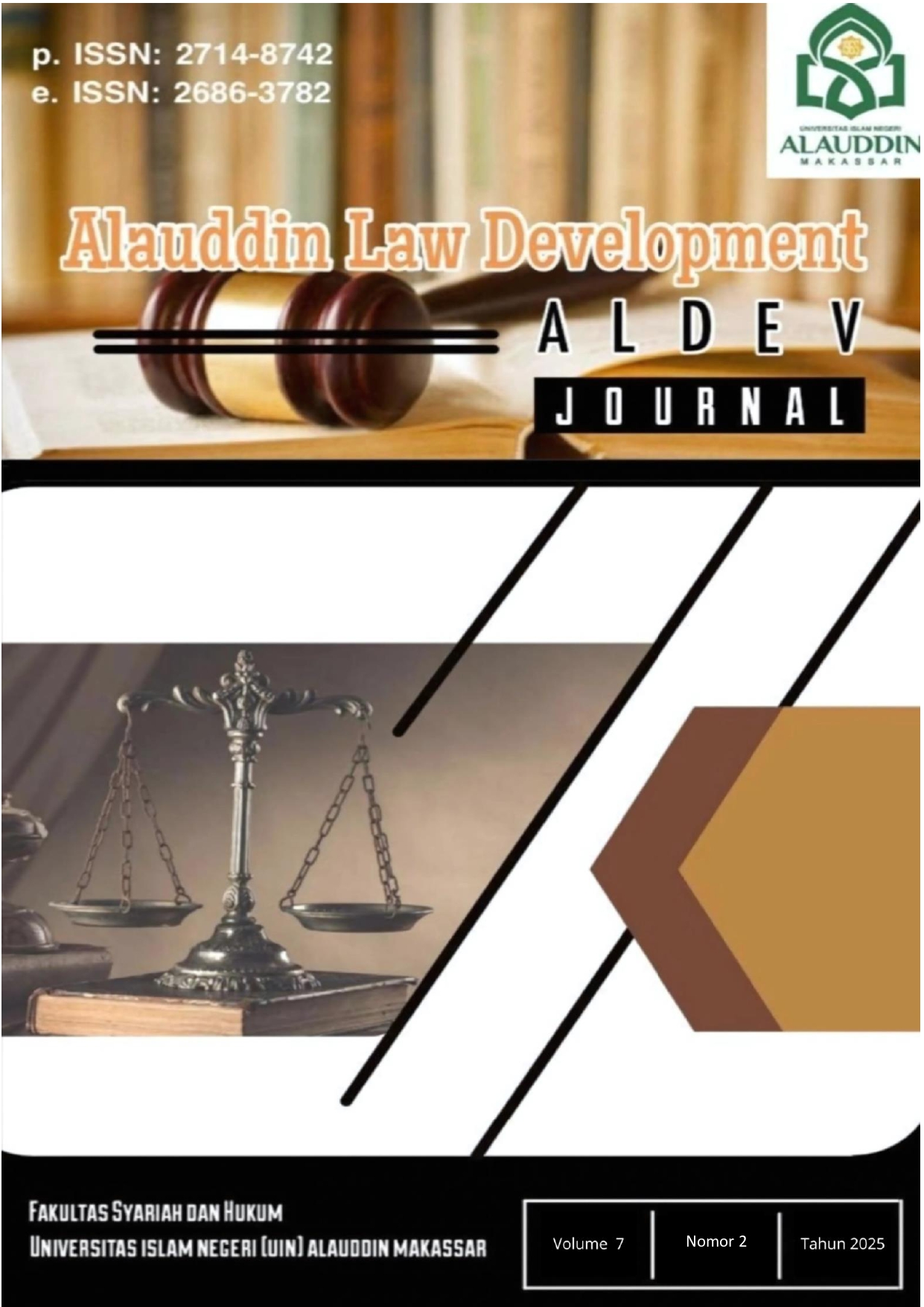“Am I Being Silenced by a Machine?” AI-Driven Content Moderation and The Chilling Effect on Freedom of Expression
DOI:
https://doi.org/10.24252/aldev.v7i2.57618Keywords:
Artificial Intelligence, Chilling Effects, Content Moderation, Freedom of Expression, International Human Rights LawAbstract
As artificial intelligence increasingly governs online content moderation, concerns have mounted over its implications for freedom of expression and democratic participation. This paper aims to examine the legal and human rights challenges posed by AI-driven content filtering, with a focus on the emergence of chilling effects and unequal impacts across user groups. Using legal doctrinal analysis, this study interrogates how algorithmic moderation models operate and how they align—or fail to align—with international human rights norms. The findings reveal that AI systems frequently suppress lawful speech, especially from marginalised communities, due to biased training data and opaque decision-making processes. Furthermore, existing regulatory responses remain fragmented, lacking the transparency, accountability, and normative clarity required to uphold free expression. Drawing from recent UN reports and resolutions, the paper highlights growing international critiques and supports calls for human rights-based governance to ensure AI fosters an inclusive, rights-respecting digital age.
References
Ahmed, Syed Hammad, Muhammad Junaid Khan, Hafiz Muhammad Umer Qaisar, and Gita Sukthankar. 2023. “Malicious or Benign? Towards Effective Content Moderation for Children’s Videos.” Edited by Franklin M. and Chun S.A. The International FLAIRS Conference Proceedings 36 (May). https://doi.org/10.32473/flairs.36.133315.
Ajani, Taiwo, and Tammy Ferrante. 2024. “Cyber-Analytics: An Examination of Machine Learning Algorithms for Spam Filtering.” Issues in Information Systems 25 (2): 203–13. https://doi.org/10.48009/2_iis_2024_116.
Akhil, Karnam, Jangili Sireesha, Gundu Venkata Sai, Katanguri Sai Shashidhar Reddy, and Jonnalagadda Haripriya. 2023. “Harnessing Artificial Intelligence for Preventing and Detecting Addiction in Digital Healthcare and Social Media among Students of Age Group 12 to 18.” In 2023 5th International Conference on Advances in Computing, Communication Control and Networking (ICAC3N), 936–42. IEEE. https://doi.org/10.1109/ICAC3N60023.2023.10541714.
Al-Sherman, Naser. 2024. “Legal Protection from Artificial Intelligence Technology Used to Filter Visual Contents via the Internet.” Pakistan Journal of Criminology 16 (1): 505–17. https://doi.org/10.62271/pjc.16.1.505.517.
Albraikan, Amani Abdulrahman, Mohammed Maray, Faiz Abdullah Alotaibi, Mrim M. Alnfiai, Arun Kumar, and Ahmed Sayed. 2023. “Bio-Inspired Artificial Intelligence with Natural Language Processing Based on Deceptive Content Detection in Social Networking.” Biomimetics 8 (6). https://doi.org/10.3390/biomimetics8060449.
Alkiviadou, Natalie. 2022. “Artificial Intelligence and Online Hate Speech Moderation.” SUR: International Journal on Human Rights 19 (32): 101–12. https://sur.conectas.org/en/artificial-intelligence-and-online-hate-speech-moderation/.
Ashraf, Cameran. 2022. “Exploring the Impacts of Artificial Intelligence on Freedom of Religion or Belief Online.” International Journal of Human Rights 26 (5): 757–91. https://doi.org/10.1080/13642987.2021.1968376.
Babu, C V Suresh, and S Deva Darshini. 2025. Detecting Hate Speech in the Digital Age: AI Solutions for Real-Time Moderation. Edited by Swati Chakraborty. Ethical AI Solutions for Addressing Social Media Influence and Hate Speech. IGI Global. https://doi.org/10.4018/979-8-3693-9904-0.ch012.
Caruso, Corrado. 2025. “Towards the Institutions of Freedom: The European Public Discourse in the Digital Era.” German Law Journal 26 (1): 114–37. https://doi.org/10.1017/glj.2024.68.
Chang, Bingtao, Weiping Wen, Xiaojie Wu, Siyang Cheng, Jianchun Jiang, and Rui Mei. 2025. “TCLens: Towards Toxicity Tags Aggregation of Massive Labels Generated by Content Moderation for AIGC.” In CSAI 2024 - Proceedings of 2024 8th International Conference on Computer Science and Artificial Intelligence, 466 – 473. Association for Computing Machinery, Inc. https://doi.org/10.1145/3709026.3709114.
Elkin-Koren, Niva. 2020. “Contesting Algorithms: Restoring the Public Interest in Content Filtering by Artificial Intelligence.” Big Data & Society 7 (2): 1–13. https://doi.org/10.1177/2053951720932296.
Elmimouni, Houda, Sarah Rüller, Konstantin Aal, Yarden Skop, Norah Abokhodair, Volker Wulf, and Peter Tolmie. 2025. “Exploring Algorithmic Resistance: Responses to Social Media Censorship in Activism.” Proceedings of the ACM on Human-Computer Interaction 9 (2): 1–24. https://doi.org/10.1145/3710970.
Fahrudin, Adi, Siddhartha Paul Tiwari, and Kus Hanna Rahmi. 2025. “Psychological Well-Being of Human Content Moderators and Wellness Strategies in AI-Driven Content Moderation Organizations.” In Content Moderation in the Age of AI, edited by Siddhartha Paul Tiwari, 221 – 249. IGI Global. https://doi.org/10.4018/979-8-3373-0335-2.ch009.
Frosio, Giancarlo. 2024. “Algorithmic Enforcement Tools: Governing Opacity with Due Process.” In Driv. Forensic Innovation in the 21st Century: Crossing the Valley of Death, edited by Simona Francese and Roberto S. P. King, 195 – 218. Cham: Springer International Publishing. https://doi.org/10.1007/978-3-031-56556-4_9.
Gambetti, Alessandro, and Qiwei Han. 2023. “Dissecting AI-Generated Fake Reviews: Detection and Analysis of GPT-Based Restaurant Reviews on Social Media.” In International Conference on Information Systems, ICIS 2023: “Rising like a Phoenix: Emerging from the Pandemic and Reshaping Human Endeavors with Digital Technologies.” Association for Information Systems.
Gentelet, Karine, and Sarit K. Mizrahi. 2024. “A Human-Centered Approach to AI Governance: Operationalizing Human Rights through Citizen Participation.” Human-Centered AI: A Multidisciplinary Perspective for Policy-Makers, Auditors, and Users, 215–30. https://doi.org/10.1201/9781003320791-24.
Ghose, Anuttama, Pallav Pallav, and S M Aamir Ali. 2025. “AI and Political Polarization: Analyzing the Impact of Algorithmic Bias on Governance in Diverse Political Systems.” In Economic and Political Consequences of AI: Managing Creative Destruction, edited by Siddhartha Paul Tiwari, 135 – 159. IGI Global. https://doi.org/10.4018/979-8-3693-7036-0.ch007.
Gongane, Vaishali U, Mousami V Munot, and Alwin D Anuse. 2024. “A Survey of Explainable AI Techniques for Detection of Fake News and Hate Speech on Social Media Platforms.” Journal of Computational Social Science 7 (1): 587 – 623. https://doi.org/10.1007/s42001-024-00248-9.
Goswami, Manasvin Veenu. 2020. “Algorithms and Freedom of Expression.” In The Cambridge Handbook of the Law of Algorithms, edited by Woodrow Barfield, 558–78. Cambridge: Cambridge University Press. https://doi.org/10.1017/9781108680844.027.
Gunton, Kate. 2022. “The Use of Artificial Intelligence in Content Moderation in Countering Updates Violent Extremism on Social Media Platforms.” In Artificial Intelligence and National Security, edited by Reza Montasari, 69 – 79. Cham: Springer International Publishing. https://doi.org/10.1007/978-3-031-06709-9_4.
Downloads
Published
How to Cite
Issue
Section
License
Copyright (c) 2025 Ramalina Ranaivo Mikea Manitra

This work is licensed under a Creative Commons Attribution-ShareAlike 4.0 International License.
All writings published in this journal are the authors' personal views and do not represent the views of this journal or the authors' affiliated institutions. Author(s) retain copyrights under the license of Creative Commons Attribution-ShareAlike 4.0 International (CC BY-SA 4.0).


